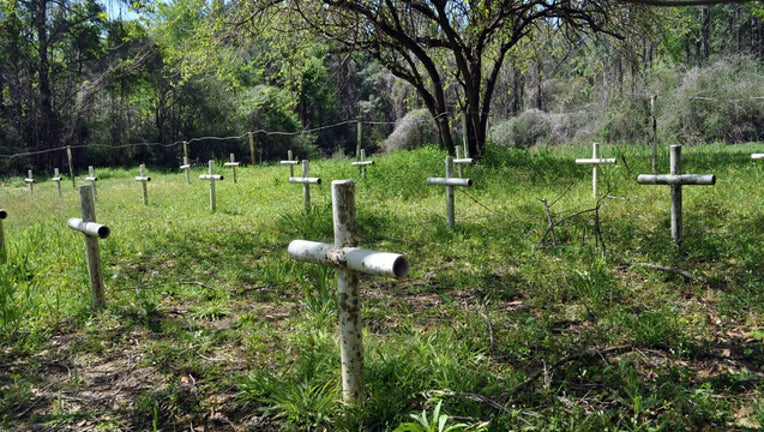State to further examine grounds of Dozier reform school

Dozier site (FOX file / 2013)
TALLAHASSEE, Fla. (NSF) - Forensic experts will return next month to the site of a notorious state reform school --- where the remains of more than 50 people were unearthed in 2015 --- to find out what lies in 27 additional sites.
Florida Secretary of State Laurel Lee said Thursday that once they can determine what the below-ground "anomalies" are at the former Arthur G. Dozier School for Boys in Marianna, officials will then begin to establish "appropriate next steps," which could include further digging.
"This is an issue of great importance and great sensitivity," Lee said during a press briefing at the Mission San Luis in Tallahassee. "It is something that is very important to our state and to all of the stakeholders who are here today."
The proposed budget for the next fiscal year, which begins July 1, contains about $850,000 for the continued examination of the site. Gov. Ron DeSantis, who appointed Lee, is expected to act on the budget this week.
Erin Kimmerle, a University of South Florida forensic anthropologist who oversaw the initial excavation, will return to Dozier to follow up on a ground-penetrating radar scan of the school grounds, which fixed on 27 locations during a pollution cleanup in March.
The location is a few hundred yards from where the remains of seven former students exhumed in 2015 were recently reburied.
The state has worked to reunite the remains of those buried at Dozier with surviving family.
More than 500 former students have alleged brutal beatings, mental abuse and sexual abuse at the Dozier school, which closed in 2011 after 111 years of operation.
Charlie Fudge, sent to Dozier from his home in Bradenton in 1960 as a 12-year-old because he "smoked, skipped school and we came from a poor family," still recalls the beatings he and others endured at the hands of those running the reform school.
A member of the "White House Boys" group, which is named after a facility at the school where boys were beaten and abused, Fudge said he believes more than 100 graves could be found if the state investigates the entire 1,400-acre site.
"Those boys, a lot of them probably died trying to get away from there," said Fudge on Thursday. "To have their bodies still there is very emotional, and very sad."
In 2017, the Florida House and Senate passed resolutions formally apologizing for the abuse of juveniles sent to Dozier and a related facility in Okeechobee.
The resolutions acknowledged that treatment of boys sent to the facilities was cruel, unjust and "a violation of human decency."
%INLINE%
The resolution was accompanied by a law that required the state to turn over about 360 acres, containing the Dozier site's North Campus, South Campus and Boot Hill Cemetery, to Jackson County. The law required memorializing the cemetery and what was known as the "White House" on the campus.
Last year, former Gov. Rick Scott steered $5.8 million Jackson County to redevelop the Dozier campus into a regional distribution and manufacturing center. Also, Scott and members of the Cabinet agreed to transfer, at no cost, another 919 acres that the county wants for economic-development efforts.
Local officials have targeted the site, north of Interstate 10, for government offices and to attract private businesses. But Clint Pate, chairman of the Jackson County Commission, said Thursday such plans have slowed down, as the region continues to recover from Hurricane Michael.

